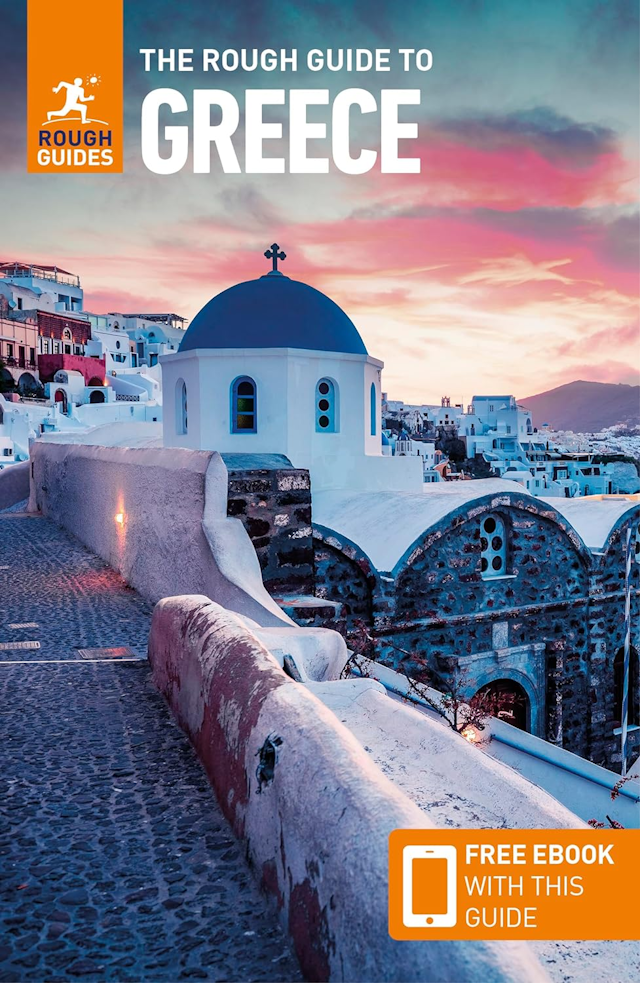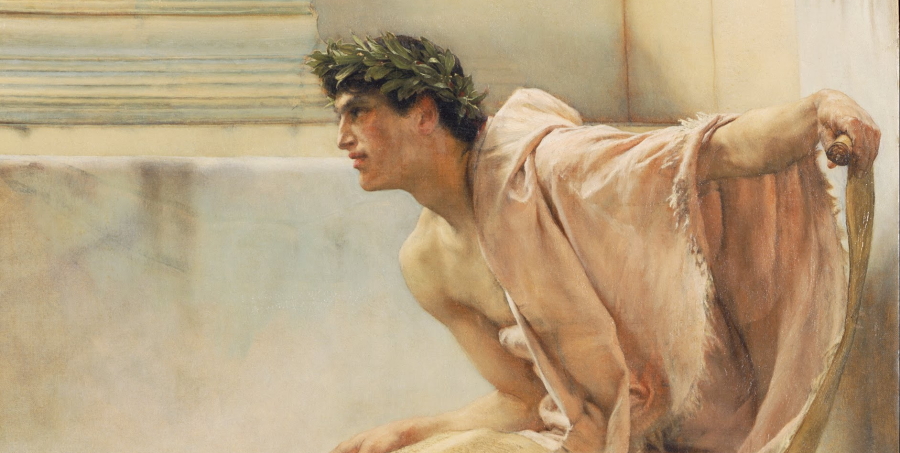- HOME
- Greek Drama
Greek Drama
The Golden Age of Greek drama saw playwrights including Aeschylus, Sophocles, Aristophanes, and Euripides all writing, and you can still see their plays performed at the ancient theatre at Epidavros.
Ancient Greece was the birthplace of modern drama. The 5th century BC, known as the Golden Age of Pericles (after the great Athenian statesman), was a time when the arts, architecture, and politics all flourished in Athens, with the dramatic arts high on the agenda.
The very word 'drama' derives from the Greek verb for 'to do', and the dramatic form developed in the 6th century BC from an acting out of stories or songs. It is thought that drama originally derived from a choral tradition in which choirs would sing hymns in honour of the gods - but hymns that included some kind of narrative or story. On one occasion, a choral leader named Thespis (hence the word 'thespian' for an actor) stepped out from the chorus and began to make the hymns more dramatic and active.
The Chorus
The chorus remained an essential part of early Greek plays. The chorus was made up of a group of observers who interpreted and commented upon the action as it unfolded, as if the audience could not understand it for themselves. The plays were written in verse and alternated the performance of scenes with choral interjections. Gradually, as the art developed and the possibilities of drama were explored more, the chorus became less important.
The works of many of the playwrights from those ancient times are still performed all around the world - and during the summer season in an original setting at the magnificent old theatre at Epidavros, as well as in Athens at the Herodes Atticus Theatre (see below).
Aeschylus
Three writers dominated the developing drama of tragedy in ancient Greece: Aeschylus, Sophocles, and Euripides. Aeschylus (circa 525-456 BC) introduced a dramatic feature that might seem simple and obvious to us today but was revolutionary at the time: a second character on the stage. Until then, all plays had been monologues, the telling of tales in the tradition of Homer. With Aeschylus, poetry and drama began to mingle.
Aeschylus drew on his experiences as an Athenian soldier (he fought at the Battle of Marathon in 490 BC, for example), especially in plays such as The Persians and Seven Against Thebes. The best-known of his works that have come down to us are Prometheus Bound, which is the only surviving part of what was originally a trilogy, and the Oresteia, a complete trilogy about the doomed family of Agamemnon.
Sophocles
One of Aeschylus's great rivals was Sophocles (circa 496-405 BC), another Athenian tragedian. The innovation which Sophocles introduced was to go one better than Aeschylus and have a third character on stage. This increased the dramatic possibilities, and at the same time Sophocles began to play down the previously important commentary role performed by the chorus. In short, Sophocles wanted to let the action speak for itself.
The greatest of his seven major surviving works is undoubtedly Oedipus Rex, a masterwork from any age of drama, let alone from an art form still in its infancy. His other well-known works include Antigone and Electra
Euripides
The third towering figure of those days is Euripides (circa 480-406 BC), who devised much more intricate plots than his predecessors had, and allowed his characters to speak with much more natural dialogue. The technique brought him much criticism at the time, but it was clearly a breakthrough in the development of drama.
The most famous works of Euripides include Medea, The Bacchae, and his version of the Electra story (it's not known whether Sophocles or Euripides wrote their version first). All three of these dramas, and some others from the almost twenty that survive, are performed today. Euripides was an early example of an artist whose works became even more popular after his death than when he was alive.
Aristophanes
But it wasn't all tragedy during this period. Many humorous and satirical plays were also being written during this great Athenian golden age. Another Athenian, Aristophanes (circa 450-385 BC), was the outstanding playwright in this genre. Humour usually has the shortest of shelf lives, but the plays of Aristophanes, including The Birds and The Frogs (in which he spoofs his fellow dramatist Euripides), continue to be performed all over the world.
However, Aristophanes' most famous comedy, with a theme that has been borrowed again and again down the ages, is Lysistrata. In this comedy, wives refuse to sleep with their husbands until they agree to stop waging war.
The dramatic art was treated as seriously in historic times as it is today, and the first work of literary criticism, Poetics, was written by Aristotle in the 4th century BC.
See a Play at Epidavros
Most visitors to Epidavros see it during the day, when the site's ancient theatre is empty apart from the visitors wandering around. The setting is spectacular at any time, but it's much better if you can also see the theatre used as it was intended to be, for the staging of drama.
If you're staying nearby, or in Athens or in Nafplion, then it makes it easy to attend plays during the Hellenic Festival, held each summer. Modern plays are staged as well as ancient Greek classics, and theatre companies might include such illustrious names as the National Theatre of Greece and the National Theatre of Great Britain. Sometimes productions of opera and dance are also held here.
Tickets can be bought at Epidavros itself, or at the festival's box office arcade in Athens (Panepistimiou 39, Syntagma metro stop). If you don't have your own transport, don't worry. Festival-goers can take one of the special buses that are laid on from both Athens and Nafplion to Epidavros, and, Greeks being Greeks, the festival spirits gets started as soon as people step on board.
A second venue at Epidavros, the lesser-known Ancient Epidavros Little Theatre (dating from the 4th century BC when these famous playwrights were alive), also stages events during the festival. However, it is a much smaller venue than the main theatre so if you want to see a play on the main Epidavros stage, check when booking.
Latest Posts
-
The Lesser-Known Traditions of Greek Easter
Step off the beaten path this spring and discover the enchanting — and often surprising — Easter traditions found across Greece. -
Easter in the Mystical Castle of Monemvasia
In the castle town of Monemvasia, with its dramatic medieval backdrop and sea views, Easter is a deeply spiritual and atmospheric experience. -
Sifnos: Greece’s Hidden Culinary Star on the Rise
Sifnos, a Cycladic island, is gaining fame for its rich culinary heritage, especially the beloved melopita honey-cheese tart. -
Easter in Leonidio: A Tapestry of Light, Culture and Cliffs
In Leonidio, Easter comes alive with handmade hot air balloons in the sky and lanterns made from bitter oranges in the streets. -
April 9 Strike in Greece to Impact Public Transport, Ferries and Air Travel
Transportation and travel across Greece will face disruptions on Wednesday, April 9, as public transport, ferry and aviation workers join a nationwide strike called by Greek labor unions. -
Ancient Theater of Lefkada Brought Fully to Light Following Systematic Excavation
The Greek Culture Ministry has announced that the first ancient theater ever identified in the Ionian Islands has recently been brought fully to light on Lefkada, revealing an impressive monument that… -
Seven Greek Traditions Recognized as Intangible Cultural Heritage
From traditional barrel-making to age-old folk dances, seven new entries on Greece’s National Inventory preserve the country’s living heritage for future generations. -
Greek Air Traffic Controllers to Hold 24-hour Strike, Disrupting Flights on April 9
The Hellenic Air Traffic Controllers Union have announced a 24-hour strike for Wednesday, April 9, in response to the protest called by the Civil Servants’ Confederation (ADEDY). The strike is being h… -
Ten Best Budget Hotels on Santorini
Greece Travel Secrets picks the ten best budget hotels on Santorini, some with caldera views, some near beaches and some close to the heart of Fira. -
No Ferries in Greece on April 9 as Seamen Join Nationwide Strike
The Pan-Hellenic Seamen’s Federation (PNO) has announced its participation in the 24-hour strike called by the General Confederation of Greek Labor (GSEE) on Wednesday, April 9. The strike, which will…












